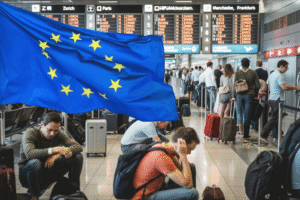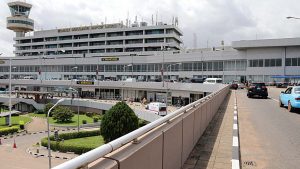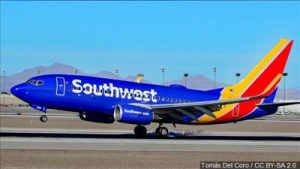NIGERIA, GHANA, LIBERIA, SIERRA LEONE, GUINEA-CONAKRY, CAPE VERDE AND GAMBIA SPEARHEAD A BOLD NEW ERA FOR AFRICAN AVIATION WITH THE SWIFT AND UNSTOPPABLE LAUNCH OF THE SINGLE AFRICAN AIR MARKET:

The launch of the Single African Air Market (SAAM) marks a historic and transformative moment for African aviation, driven by the unwavering commitment of Nigeria, Ghana, Liberia, Sierra Leone, Guinea-Conakry, Cape Verde, and Gambia. This bold new initiative aims to break down long-standing barriers in the continent’s aviation sector, paving the way for a more interconnected, competitive, and efficient air travel network. By embracing this unified approach, these nations are not only enhancing regional cooperation but also positioning Africa as a key player in the global aviation landscape.
The swift and unstoppable rollout of SAAM signals the beginning of a new era in African aviation, one where seamless connectivity, expanded access, and reduced costs become the norm, fueling economic growth and bolstering tourism, trade, and investment across the continent. Through the collaborative efforts of these nations, SAAM is set to revolutionize African skies, fostering a level of integration and cooperation that will have far-reaching benefits for years to come.
The 18th plenary session of the Banjul Accord Group (BAG), which commenced in Abuja, marked a decisive moment for the future of African aviation as key stakeholders, including representatives from Nigeria, Ghana, Liberia, Sierra Leone, Guinea-Conakry, Cape Verde, and Gambia, united with a shared mission: the urgent and strategic implementation of the Single African Air Transport Market (SAATM). This groundbreaking initiative aims to significantly reduce travel costs, increase connectivity, and foster seamless air travel across the continent. During the three-day session, aviation leaders reinforced their commitment to aligning national policies with SAATM’s provisions, ensuring that the initiative’s revised principles are fully integrated into regulatory frameworks, thus paving the way for a new era of efficient and affordable air travel in Africa.
The 18th plenary session of the Banjul Accord Group (BAG) has commenced in Abuja with a strong focus on the urgent need to implement the Single African Air Transport Market (SAATM). The initiative aims to reduce the high cost of air travel while enhancing connectivity across the African continent. The meeting, which spans three days, has brought together key aviation stakeholders, including the Directors-General of Civil Aviation (DGCAs) from various BAG member countries such as Nigeria, Ghana, Liberia, Sierra Leone, Guinea-Conakry, Cape Verde, and Gambia.
Opening the gathering, Festus Keyamo, Nigeria’s Minister of Aviation and Aerospace Development, emphasized the critical role of the SAATM in improving air connectivity, reducing travel time, and optimizing user satisfaction—all at lower costs for passengers. He highlighted that this initiative aligns with the broader goals of promoting economic integration within Africa by making air travel more affordable and accessible.
Keyamo’s remarks were echoed by Adefunke Adeyemi, the Secretary-General of the African Civil Aviation Council (AFCAC). Adeyemi stressed that BAG member states must urgently incorporate the provisions of the SAATM into their national policies and legislative frameworks. This would ensure a smooth transition toward fully embracing the revised principles of the initiative, which are designed to foster a more integrated and competitive aviation sector across the continent.
A key point in the discussions was the importance of strengthening regulatory bodies to ensure effective governance and enforcement of aviation policies. Adeyemi urged all member countries to work towards reforming their aviation sectors to meet the growing demands of the regional and international travel market. The successful implementation of SAATM depends not only on political will but also on the creation of robust regulatory institutions that can effectively oversee the sector’s growth.
Senator Buhari Abdulfatai, Chairman of the Senate Committee on Aviation, who was represented by Senator Augustine Akobundu, also weighed in on the discussions. He reiterated the Nigerian National Assembly’s full commitment to the objectives of BAG and to creating a harmonized West African aviation community. This commitment, according to Akobundu, would involve legislative reforms to support the smooth integration of SAATM within national air transport policies.
The call for action comes as Africa’s aviation sector continues to face numerous challenges, including high airfares, limited connectivity, and fragmented regulations that hinder the growth of the sector. The SAATM was established to address these challenges by facilitating the free movement of air services and creating a more integrated aviation market. This is seen as crucial for boosting intra-African trade, tourism, and economic growth, as well as attracting international investment to the region.
The SAATM is part of the broader African Union (AU) Agenda 2063, which envisions a continent that is economically integrated, interconnected, and self-sufficient. By reducing barriers to air travel and allowing airlines to operate more freely across African borders, the initiative aims to unlock the full potential of the aviation sector as a driver of economic growth. Studies have shown that greater air connectivity can significantly boost trade and tourism, which are two key areas of focus for the African Union’s development agenda.
While the implementation of SAATM has faced some delays, recent developments show promise. Several African countries have expressed their support for the initiative, and many have already signed the necessary protocols. However, full implementation requires the harmonization of policies, regulatory frameworks, and infrastructure across the continent. This means that countries must collaborate more closely to ensure the seamless operation of airlines and the effective regulation of airspace.
One of the main goals of the SAATM is to open up African skies by allowing African airlines to operate across the continent without the need for restrictive bilateral agreements. This will lead to increased competition, lower prices, and more flight options for passengers. Furthermore, it will allow African airlines to expand their operations, increasing their global competitiveness.
A significant challenge in the successful implementation of the SAATM is the disparity in the development levels of the aviation sectors in different African countries. While some nations have well-established aviation infrastructure, others are still working to improve their air transport systems. This uneven development can hinder the smooth operation of the SAATM, as it requires all participating countries to meet certain standards in terms of air safety, regulatory frameworks, and infrastructure.
Despite these challenges, the BAG plenary has reaffirmed the commitment of its members to push forward with the implementation of SAATM. The organization has pledged to continue working closely with regional and international bodies, including the International Civil Aviation Organization (ICAO), to ensure that Africa’s aviation sector is better integrated into the global transport network.
The BAG members also discussed various strategies for overcoming existing barriers to the implementation of the SAATM. One of these strategies involves providing technical and financial support to countries that may struggle with the resources required to meet the necessary aviation standards. Additionally, the BAG is focusing on capacity-building programs to strengthen the skills of aviation professionals across the continent, ensuring that they are equipped to manage the evolving challenges of the sector.
In his closing remarks, Festus Keyamo urged all BAG members to continue to prioritize the goals of the SAATM and to work collaboratively to build a more integrated and sustainable African aviation market. He called on the governments of African countries to ensure that their national policies and regulations are in line with the objectives of the SAATM, stressing the importance of collective action in achieving the desired outcomes.
As the plenary session progresses, it is clear that the implementation of the SAATM is critical for the future of African air transport. By reducing the high cost of travel, increasing connectivity, and fostering greater competition, the initiative has the potential to transform the aviation landscape across the continent. With continued commitment and collaboration from all stakeholders, the dream of a more connected and economically integrated Africa could soon become a reality.
The 18th plenary of the Banjul Accord Group (BAG) kicked off in Abuja with representatives from Nigeria, Ghana, Liberia, Sierra Leone, Guinea-Conakry, Cape Verde, and Gambia emphasizing the urgent need to implement the Single African Air Transport Market (SAATM) to reduce travel costs and boost air connectivity across Africa. The meeting aims to align national policies with SAATM’s revised principles for a more integrated and efficient African aviation sector.
Nigeria, Ghana, Liberia, Sierra Leone, Guinea-Conakry, Cape Verde, and Gambia are leading a transformative shift in African aviation with the rapid launch of the Single African Air Market, a bold initiative aimed at fostering seamless connectivity, reducing travel costs, and driving economic growth across the continent.
In conclusion, the urgent implementation of the Single African Air Transport Market (SAATM) remains a key priority for African aviation stakeholders. As the Banjul Accord Group (BAG) continues to drive efforts towards greater air connectivity and the reduction of travel costs, the successful realization of SAATM will not only enhance regional integration but also unlock significant economic opportunities for the continent. Through collective action, sustained political will, and strengthened regulatory frameworks, Africa’s aviation sector can reach new heights, benefiting both travelers and the broader economy.
Source: travel and tour world









